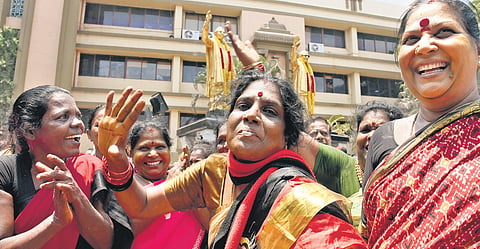

CHENNAI: In the history of Lok Sabha elections in the country, Tamil Nadu has followed a unique trend ever since the DMK came to the fore in 1967, ushering in an era dominated by the party and its other Dravidian offshoot, the AIADMK. Unlike any other state, Tamil Nadu has always picked its MPs from not more than two political fronts.
There has never been an instance where an independent candidate or a person from a third political front or a party got elected as an MP during general elections. The trend is unique for the state, with a few exceptions being some of the smaller states and union territories with less than 10 Lok Sabha seats, such as Himachal Pradesh, Goa and Meghalaya.
The other sole exception among states with 10 or more seats is the young state of Chhattisgarh with 11 seats. It has elected its MPs from either the National Democratic Alliance or the United Progressive Alliance in the four general elections it faced since its formation in 2001.
Tamil Nadu stands unique among all the 17 other bigger states, which have 10 or more Lok Sabha seats. Even in states like Kerala, Gujarat, Madhya Pradesh and Rajasthan, where the political landscape is bipolar like Tamil Nadu’s, there have been instances where an MP from a third party or front was elected in an election along with the two major alliances.
While all the 39 seats in Tamil Nadu were bagged by either the DMK-led or AIADMK-led alliances since 1977, 2014 saw a difference when 37 seats went to AIADMK and the remaining two (Kanyakumari and Dharmapuri) to the NDA. As can be seen, even in this election the winners came from only two political formations with the DMK-led alliance getting routed.
This election stood out for witnessing a five-cornered contest with AIADMK going alone, DMK dropping Congress from its alliance, Left parties forming their own front, and the NDA bringing together a number of parties, including DMDK and PMK. The five-cornered contest favoured BJP in Kanyakumari and the caste consolidation post the Dharmapuri violence in 2012 favoured PMK there.
Attempts were made in 1996, 1998, 1999, and 2009 by parties like MDMK, Tamil Maanila Congress, and DMDK to emerge as alternatives to the dominant Dravidian parties, but they were unsuccessful.
It remains to be seen if the BJP, which is now confident of emerging as an alternative in Tamil Nadu, will succeed in the upcoming 2024 election. S Venkatanarayanan, researcher and columnist who teaches political science in a university in Bengaluru said, while it is doubtful that the BJP will win seats in the current elections, it is highly likely that the party will increase its vote share significantly, thus denting the bipolar political landscape.
Arguing that the BJP was strategically weakening the AIADMK intending to claim its space and reap the anti DMK votes, he said the national party’s growth in vote share will come at AIADMK’s cost. He observed that the BJP has been successful to a degree in targeting specific caste groups, especially the Gounders and Nadars, which is likely to contribute to their increase in vote share.
Numbers Speak
The table shows how the 39 Lok Sabha seats in Tamil Nadu have been bagged by only two political fronts in every election since 1967. It also shows how decisively the state votes with more than 90% of seats going to one alliance in 10 of the 14 elections since 1967. Three of them were a clean sweep, two by the DMK-led alliance and one by the AIADMK-led alliance